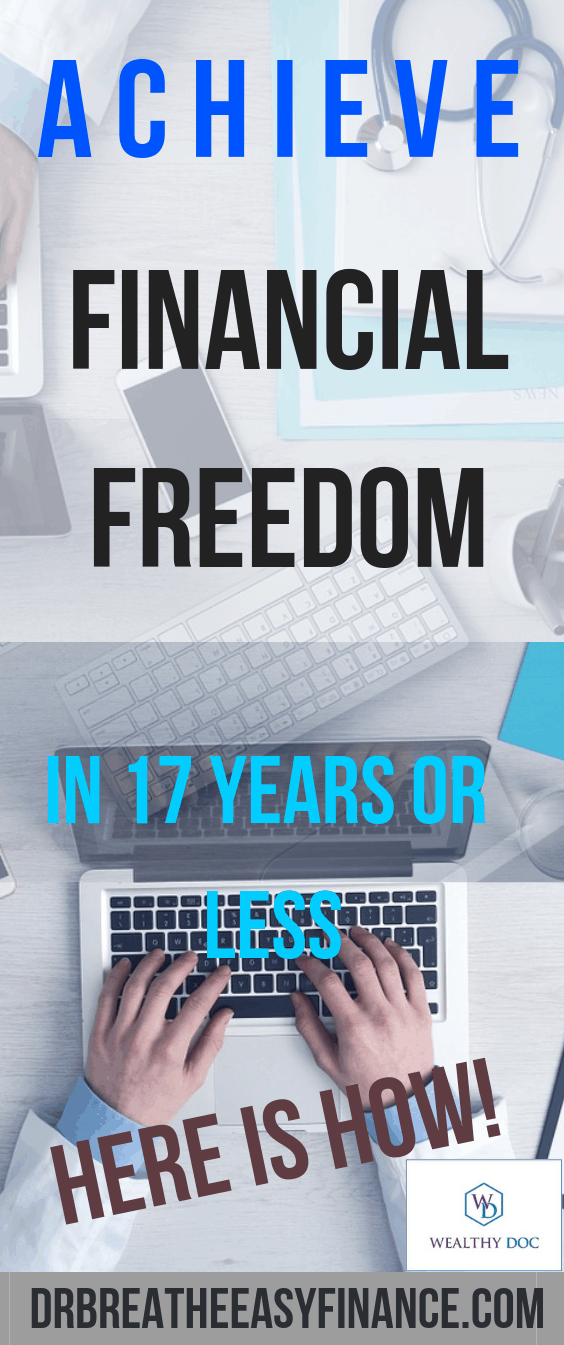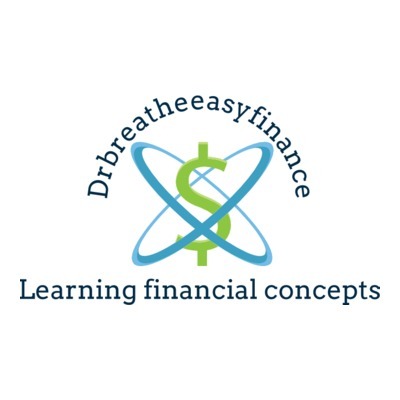I grew up poor and realized I didn’t want to stay poor. Education, help from others and determined sustained effort still work in America. I have been very blessed. I feel compelled to give back and to share with others what I learned along the way.
Doctors have very high incomes but rarely end up accumulating substantial wealth. In fact, most live from paycheck-to-paycheck. Despite making $5-$6M or more over a career, fewer than 1 in 4 doctors even have a million bucks at age 65.
There are many reasons why these high earners don’t do well financially. These include a late start to earning and saving, high debt loads, poor negotiation skills, ignorance of finance and investing, overspending habits, being overly trusting of “advisors” and overconfidence in investing skill (I’m a doctor. I’m smart. I can do this better than the professionals. Yeah, right!).
Through over 30 years of investing, building successful practices, and finance MBA training, I have gained a lot worth sharing.
When I share with other doctors that I’m debt-free and financially independent they are all ears. I enjoy helping others to learn from the mistakes I (and others) have made.
You can read more articles on my blog – Wealthydoc
Table of Contents
What do you do for a living?
I’m a physician. I cut back to part-time a year ago and now work three days a week.
Do you have a degree and are you currently using your degree?
Yes. Although I dropped out of high school in the 11th grade, I later went to community college. Transferring those credits to a 4-year school helped me get a BA.
My Associates was in Liberal Arts. That gave me a strong foundation in philosophy, history, literature etc.
That foundation helps me see trends and understand the world around me. History repeats itself.
The stories of mythology and literature reflect the thoughts and feelings of people. Those don’t change much over time. Although some think a liberal arts education isn’t practical, I disagree.
My bachelor was also in Liberal Arts, majoring in Chemistry. I dove deep into analytical philosophy, symbolic logic, and analytical chemistry.
Those modes of thinking and reasoning are useful. Learning to think like a skeptical scientist has kept me from being too gullible.
The MD is of course useful. I learned a lot about how people work in medical school and in residency.
Literally through anatomy and physiology, we learn about all the parts of people. More importantly, they taught me how to be an excellent listener when taking a patient’s history.
That is a vital and rare skill these days. In the clinics and as part of a hospital team I learned what motivates people, what they enjoy, and how to lead.
MBA skills and connections have come in handy as well. My business school is usually listed in the top 20. It wasn’t an easy degree for me to obtain.
I was surprised by how hard it was. I thought after medical school things couldn’t get much tougher. But I was wrong. Medical school involves a lot of memorization.
Graduate school requires some knowledge acquisition but also new ways of thinking. My Excel spreadsheet skills were too rudimentary to keep up with the engineers and financiers in the class.
The MD and MBA helped me get the job I now have, and they provided the knowledge and skills I needed to make my clinics succeed.
How long have you worked in your field and what is your current salary range? Only if you want to, however, it is better to give our readers some perspective. If they are low-income earner vs high-income earner, the strategies might differ.
I have been in practice for 20 years. I am a high-earner. My family and my employer don’t want me posting salary information.
Physician specialists typically make $300K and up. I started out making less than half that for many years but have built up income and assets over my career.
I have also taken two voluntary large pay cuts. That is very rare. I don’t know anyone else who has done that twice.
The first one was to leave the town of my practice and to go into academia. That was a good move for my wife and family, and I survived the pay cut.
It opened for me new horizons and connections. Each work environment has its own pros and cons.
The second cut was last year when I decided to drop my medical directorships, administrative work, and go part-time.
I don’t regret either of these major moves because despite the decreased income they helped me grow as a person, improve my family life, and boost my quality of life.
It is a reminder that income isn’t the only factor in happiness. Sometimes chasing a higher salary can ruin a life. I’m glad I didn’t do that.
What major debt have you paid off that you feel is a hurrah moment for you?
I think my debt-load peaked at around $490K. The debt breakdown went something like this:
$200K home mortgage
$120K surgery center investment
$70K student loans
$65K office building and practice assets
$20K car loans
$15K credit cards
The biggest hurrah was paying off my student loans. I remember it felt like Sallie Mae was an unwanted mistress and my wife and I couldn’t wait to boot her out of our life.
Eric Tyson’s concept of Good Debt vs. Bad Debt has been criticized. Good debt is a loan to buy something that is likely to go up in value. Education, real estate, or business are examples.
Good debt is a loan to buy something that is likely to go up in value. Education, real estate, or business are examples. Share on XBad debt is a loan for something that won’t maintain its value or will go down. These include a car loan, boat loan, or credit card debt.
Bad debt is a loan for something that won’t maintain its value or will go down. These include a car loan, boat loan, or credit card debt. Share on XI see the point of those who say no debt is good. Ideally, we don’t need it. But I grew up poor and I needed to take on some debt to get going.
I had assets but they were in the form of human capital. That takes time to convert human capital into financial assets.
In the meantime, there is tuition to pay and groceries to buy. A loan allowed me to bridge that gap.
I’m debt-averse by nature. I don’t take a lot of risks blindly. I don’t like promising my future work away to make payments. That feels like indentured servitude and I value independence.
On the other hand, there is something bad about being debt-averse above all else. I can think of a couple of examples.
Like my friend Fred in rural PA who lived in a small rusty trailer at age 40 because he “didn’t believe in debt.” Or my father who bought his house for a dollar. It was a rundown shack, but by golly, he owned it free and clear. No thanks. That isn’t how I want to live.
Once I was in a better financial place, I began attacking the debt. The bad debt first and then the good debt.
Describe to us in detail, the strategies you used to pay off that/those debt(s)
For the credit card debt and car loan debt, I paid those off first and never did that again.
Fortunately, they were small enough for my income at that point. My prior troubles with credit card debt in residency didn’t end as well.
Back then, I was disorganized, lacked free time, and had little income. I got behind in payments and couldn’t afford the interest and penalties.
I resorted to using a credit card counseling service. Embarrassing but true. Some of us need to learn obvious lessons the hard way. Don’t go into credit card debt. Duh!
Student loan debt was next on my list to go. I paid it out of my salary. My goal was to get rid of it within 2-3 years and we did.
We lived in an apartment and then a small rental house until that was paid. My physician partners were living in mansions, taking exotic vacations, and golfing in country clubs.
As Dave Ramsey would say, “I lived like nobody else so that later I can live like nobody else.” Many doctors now envy my financial success and want to learn how I did it.
For the building, I paid down the mortgage with rental income. My practice and I were one of the tenants.
We raised the rent to stay at competitive fair-market values. We also got tenants, such as a physical therapy center that boosted our rental income.
When I later left the practice and sold my interest there was price appreciation.
For the surgery center, I used dividend payments to pay off the loan. The center was profitable, and the physician investors would get four checks per year.
They would go on a spending spree. I would pay down my loan. When the loan was paid off, I would use those dividend checks for investing.
When I left the practice and sold my shares I enjoyed the price appreciation.
We took the money from the price appreciation of the building and surgery center and used that as a down payment on a house.
We bought a modest home using a conventional mortgage and 20% down. The mortgage broker literally laughed at me for being so old-fashioned.
He recommended $0 down and a 5/1 ARM. I believe that mortgage company later went bankrupt, so I felt redeemed.
The mortgage payment was affordable, but I still wanted to get rid of it within 5-6 years. We aggressively paid it down.
Later, we moved to a larger house in a nicer neighborhood. The first house was paid off at that point. We took out a small mortgage to buy the new house and rented out the old house.
Since the rental house had no debt, all the rent checks were used to reduce our mortgage on our primary residence. When that was paid off, we then owned two houses free and clear.
Do you have any other debt left? What kind of debt? What are your goals to pay off this debt?
I have been debt-free for over 15 years. I have no plans to go back into debt. I enjoy receiving interest payments, but I never enjoyed paying interest.
Do you budget? Why or why not? Which method do you use?
I do not budget and never have. I wrote a post about that. I think it is a great thing to do in principle.
I hate even trying to do it. I’m a big-picture guy. Going through receipts for how much I spent on coffee in February would drive me bananas.
Fortunately, my income and savings rates have been high enough that I can do fine without budgeting.
Check out how to budget to live the life you want
Check out our post on why budgeting might not be right for everyone.
What percentage of your monthly income do you save?
I recommend a 15% savings rate (gross) for most people. That assumes they will live modestly and work an entire career.
For physicians, the minimum is thought to be closer to 20%. That is because their debt loads are high, and their first large paycheck doesn’t come until age 30 or later.
I recommend doctors save much more than the minimum of 20%. My favorite savings rate is 38% of gross which works out to about 50% of net income.
That provides financial independence for most within 17-20 years.
Why that level and timeframe?
Because even those who think they will work as a doctor into their seventies should do that because they want to.
Being forced to work that long isn’t pleasant. Medicine is an intense and stressful career.
After 20 years you may feel burned out. Most doctors do. Being Financially Independent (FI) provides options.
You can change jobs, downshift, drop a call, or work part-time. I don’t recommend early retirement, but it is always an option at that point.
So, back to your question. I never had a fixed savings rate and I didn’t even track it consistently. I paid for necessities and many wants and invested all the rest. That varied a lot depending on productivity and bonuses. Since I reached FI within 17-18 years of practice I think my gross savings rate likely averaged around 38%.
I find it easy to save. My wife and I are frugal. We have no debt. Investment income gets reinvested which boosts our savings rate higher.
Do you have any passive income sources?
Heck Yeah! Of course! Always have. Always will. Everyone should!
Depending on your employer alone for your financial security is risky. Talk about putting all your eggs in one basket! There are a lot of financial and social benefits of working. But it shouldn’t be your only income source. W-2 income is the worst kind of income because it requires daily work and then it is taxed at the highest possible rate.
I’m working on building more now. Some of my current income includes quarterly dividends, capital gains, multifamily apartment rentals, single-family homes, medical office building, a private company, imaging center, and surgery centers.
Do you rent or own your own home/condo/apartment?
Rent is like interest payments: something I receive, not something I pay. In some communities, it may make sense to rent. Especially if you don’t have a down payment or if you might move in a couple of years. But for me, having a home and a neighborhood to raise my kids in is important. I don’t see my house as an investment.
Read more about 6 reasons you are not ready to buy a house. It showcase the 6 things you have to take care of before buying a house
Which side of the argument are you in terms of paying off mortgage vs investing?
I’m asked this all the time. I think it is kind of a silly argument though. If I had to pick, I would say paying off debt is always my preference.
The benefits of any tax deduction are overstated. Even those minimal benefits are phased out at higher incomes. Paying off debt provides a consistent and guaranteed return. Investing for any significant return will require taking on risk and allowing volatility.
When comparing paying off a 6% loan vs investing for an expected 8% return, we need to risk-adjust before comparing the two. Otherwise, you are trying to compare an apple to an orange. They just are not the same thing at all.
But there are cases where that isn’t the optimal financial choice. I base it more on my emotions. I enjoy being debt-free. It feels good. It isn’t a number in a spreadsheet.
There you go. Another awesome interview in the series. The article was so good there was no need for any preamble.
Here is the link to binge on all the get out of debt series
Other posts in the series include
Xrayvsn crawled out of $600,000 debt and the worst divorce in history and still managed to reach financial freedom.
From one Geek To Another became debt free at a tender age of 27. Phenomenal post, soo good, it also got featured by passive income journal club MD.
Money Saved Is Money Earned is the master in stretching that dollar. Low income did not stop him from getting out of debt.
How We Paid Off $340,000 Mortgage In 3 Years By Saving 86.5% Of Our Income (By HisHerMoneyGuide)
Check out some of the tricks we used to pay off over $200,000 student loan debt by 6 months out of training.
Let us know if you have paid off a certain debt and would like to inspire others.
Please comment and let us know what you think or add your own story
Pin the image and share our content. We are highly encouraged when our fans do this
Subscribe for more awesome content.
I am a pulmonary and critical care doctor by day and personal finance blogger/debt slaying ninja by night.
After paying off close to $300,000 in student loan debt in less than 6 months into my real job, I started on a mission to help others achieve the same. There is no magic to this than to strap up and get it done. Some of the ways we achieved this include side hustle, budgeting, great negotiation skills, and geographical arbitrage.
When I was growing up, common knowledge in Nigeria is that there is one thing you cannot trust anyone else with, and you guessed it – your money.
Being frugal came easily to me based on my background. However, the concept of building wealth did not solidify in my mind until when I finished medical school. I wish I knew what I know now when I was 14. Still, I don’t know enough and I am constantly learning to improve my knowledge.
My goal is to reduce financial illiteracy among young professionals. I am catering to the beginners – babies and toddlers in financial literacy.









ImmigrantFinances says
WealthyDoc, this is truly a great post and very inspiring. You show doctors how it can be done and I certainly am trying to follow your footsteps in being 100% debt free and become FI as soon as possible. Great post and great series DBEF!
xrayvsn says
Big fan of Wealthy Doc and great interview. His philosophy and mine mesh up really well and I’m glad to see how he has tailored a medical practice that can be sustained because he has become financially independent and not chasing every dollar.
I am 100% on board the passive income train. It is good to diversify income streams and money from my passive income sources is my favorite type of money.
FiPhysician says
17 years for me too! Its about right for a 40-50% savings rate.